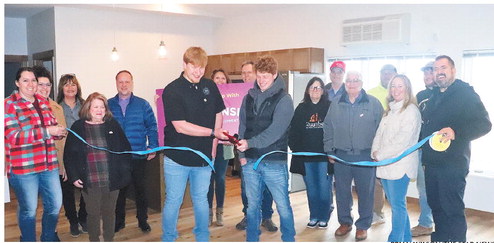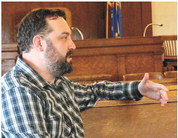Grace period considered for ‘non-negative’ student drug test results
When is a student considered guilty of violating the Medford School District’s cocurricular code regarding drug and tobacco use?
A new testing process with the district’s provider raised that question at the February 5 school board policy committee meeting. The school district each month tests five randomly selected students involved in athletics or co-curricular activities for drug, alcohol and tobacco use that are in violation of the district’s co-curricular codes.
In the past, the testing would be done in the morning and the results returned that day. If the tests came back positive for using, the penalties laid out in the code book would be implemented. According to assistant principal Andy Guden, tobacco use has been the primary violation in the years since the testing began.
Aspirus is switching to doing a rapid test with an oral swab. According to activities director Ryan Pilgrim, with this test, the district will know right away if the student tests negative for illicit substances. However, things become murkier if the test shows a “non-negative” result. Piligrm made the distinction that a non-negative result does not necessarily mean they are positive for drug, tobacco or alcohol use because there may be prescription drugs which could give a false positive. Students and parents will have to follow up with Aspirus to determine if there is medical history which will show the non-negative as being a false positive or if the student is using substances banned under the cocurricular code. The question this brings for school policy is in regard to when the penalties begin. Pilgrim asked if the students are eligible to play while having a “non-negative” result and how long of a timeframe should be allowed for the student and their family to clear it with Aspirus.
“Do we hold them out the day it will take for it to clear up?” he asked.
This leads to the situation of if a parent delays in contacting Aspirus, how long can it be dragged out before the district assumes it is a true positive result. He gave the scenario of an athlete being tested prior to the playoffs and having the season for the sport end before he is found ineligible to play.
While the district could treat all nonnegatives as being in violation and ineligible to play, this could also cause people who had false negatives due to prescriptions being punished when they did not violate the policy.
“I would like to see a grace period,” Pilgrim said, noting that the district can’t give a student athlete a game back after the fact.
Guden said he also liked the idea of a grace period, suggesting 48 hours would be enough.
“I would rather have a student who is guilty play one game than an innocent kid miss a game,” Pilgrim said.
Policy committee member Aemus Balsis said he supported grace period. As a detective with the sheriff’s department he has experience with rapid tests, noting that they can have difficulty in distinguishing between amphetamines and methamphetamine. “There are too many issues with rapid tests,” he said.
The consensus was to give a grace period of two school days between when the test comes back “non-negative” for the parents to contact Aspirus. If the family does not get back to Aspirus, as the schools’ medical resource officer, it will be assumed to be positive and the penalty portion will go into effect.
“Innocent until proven guilty is the standard we should uphold,” said RVA administrator Charlie Heckel.
The committee held off on making formal changes to the policy at this point as the school district is scheduled to begin using the new testing process for the first time this month and bring it back for review of the procedures that will need to be changed.
In other action, policy committee members: • Reviewed a new policy dealing with truancy and the Rural Virtual Academy. The RVA keeps track of “failure to participate” among students in the virtual charter school. Unlike students in traditional brick and mortar schools who will be ticketed and referred to the court for persistent truancy, in the RVA, the students violating the policy are sent back to their home districts.
• Reviewed the district’s homeless policy to make changes to bring it up to compliance with model policies ahead of a scheduled audit of the policies. “We try to be better today than yesterday, in order to be more prepared for tomorrow,” said pupil service director Joseph Greget about the changes in the code.
• Reviewed the policies regarding student transportation. Greget noted there had been a complaint of a student riding in the front seat of a school van. In that situation there had been a behavior issue involved and the placement in the van was with parent permission. Under regulations, no one under 13 may ride in the front seat. Issues were also raised with there being vans versus busses used for student transport for special education students. Greget noted that vans are cheaper than busses to operate and easier to staff for drivers. Greget said they want to make sure all the policies and procedures apply to all vehicles.
• Discussed the process to fill vacant positions on the board between elections. The first step is to ask for people to submit letters of interest to be interviewed and selected by the board. Following that the school board would actively recruit potential members. If these are not successful, the process would repeat until either the next spring election or until the position is filled. The policy will come back for additional review in March.
• Approved changes to the pre-employment drug testing to clarify that the drug testing will take place during orientation in July and not immediately at the time a staff member is hired.
• Clarified the policy regarding staff members serving as volunteers for things like ambulance and fire departments. The district may request any compensation the staff member receives for the time spent volunteering to be turned over to the school, but would only consider doing this if the district had incurred actual cost in getting a substitute. Generally this has occurred at the high school level where students can be sent to a study hall space for a period or two or other teachers can cover for the time the employee is out of the building.




